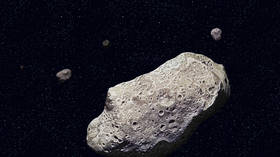Earth being buzzed by Trojan asteroid

In a paper published in the Nature Communications journal on Tuesday, researchers confirmed the discovery of the second Trojan asteroid. The term refers to a rocky space object that follows the same orbit as a planet.
Asteroid 2020 XL5 is only the second Trojan asteroid ever discovered and is approximately three times larger than the first of its kind, known as Asteroid 2010 TK7, which was identified just over a decade ago.
Asteroid 2020 XL5 was first seen on December 12, 2020, but scientists at the time had no way of distinguishing its trajectory.
To study its orbit, the team of international scientists assessed data from 2012 to 2019 and observed the object from three ground-based observatories in 2021.
From the observations, the researchers deduced that the rocky body will remain stable in its orbit, which mirrors the Earth’s, for around 4,000 years.
It remains unclear as to where the asteroid came from. It may have been part of the main asteroid belt further out in the solar system before being torn out when it felt the pull of Jupiter’s gravitational field.
Asteroid 2020 XL5 appears to be made up mostly of carbon and could possibly be the target of future space missions.
“Therefore these objects may become ideal targets for space missions and, in the more distant future, to settle human bases or install scientific hardware that would benefit from their peculiar location,” the authors write.














